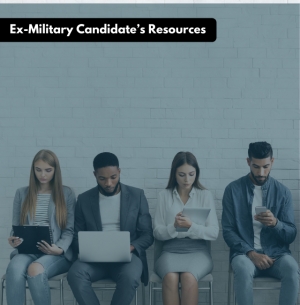Ex-Military Candidate's Resources
Questions
1. Tell us about yourself.
Recommendation:
• Plan on 2 minutes max.
• Consider starting with your immediate situation and why you have left/are thinking about leaving your current job (most relevant).
• Go back to education.
• Then each key role/phase of your professional career back up to your current situation.
2. What do you consider your key achievements? What are you most proud of?
Consider educational, professional, and personal.
3. Why are you interested in us and the role on offer?
4. What have you been told are your areas for development?
We recommend to just give one, applying the STAR method. Let the interviewer know: what did you identify and what was the positive outcome/development.
5. Tell us about a time you managed a project, or showed leadership or innovation?
Apply the STAR method. Try to use impressive examples with valuable and positive outcomes. Consider using one of your stated key achievements.
6. Tell us about a time you came up against an obstacle or were faced with confrontation?
Apply the STAR method. Use examples with positive outcomes and/or lessons learnt.
7. What is your management style?
8. What cultural differences do you think you will face between your previous/current employer and this one?
Try to highlight similarities and skills & methods that both areas share.
General principles of answering
Do
• Always apply PEPP:
o Show that you're prepared.
o Be engaging.
o Be positive and describe positive decisions and results.
o Demonstrate your professionalism.
• Always apply the STAR method when giving examples.
• Always finish on a positive – even when giving a 'negative' example.
• Always be focussed, and interested in the role on offer.
Don't
• Do not volunteer examples of failure.
• Do not answer with irrelevance or waffle – answer the question.
• Do not belittle yourself or your achievement.
• Avoid negatives, after-thoughts, cynical or sarcastic comments, and strong negative opinions.
• Never be confrontational with the interviewer.
STAR Method
An answer structured in these four components shows how you demonstrated skill in a particular context, so the potential employer can imagine how you might operate in their workplace. If you are asked to give an example of a specific circumstance, follow this method:
Situation
• Describe the situation you were confronted with. Why was it important? Why and how were you involved?
Task
• Describe the task which needed to be done to resolve the situation.
Action
• Describe what you did. Be clear about your exact role. Explain what you did, how you did it, and why you made the decisions you did.
Result
• Describe what the result was. Always volunteer examples with positive outcomes. If asked for an example of something that did not work – always use an example where positive lessons were learnt and follow this up with an example of when these lessons learnt were evidenced.
For more question examples that can help you to prepare for your interview:
⬇︎ Download here our sample interview questions ⬇︎
SOURCE: Career Transition Partnership (CTP)
Interview tips for ex-military candidates
Ex-Military Candidate's Resources
When you are planning to attend a job interview, you need to do your homework first. We encourage you to have a look at the company's website you are applying to and pay special attention to the following:
• What exactly does the company do?
• How is the company structured?
• What are the current hot topics (company and industry)?
• What are the company's values and principles?
• What does the basic information suggest? Doing well/poorly?
• Who are the key personalities?
Phone interviews:
• Agree a time when you know you can be alone and undisturbed.
• Ensure the interviewer has the correct contact number to reach you on.
• Ensure your chosen location is quiet – no background noise (traffic, chatter, children etc.)
• Ensure your chosen location has satisfactory reception if using mobile.
• Try to use a location with a table and space to spread basic documents.
Face-to-face interviews:
• Avoid cramming in revision immediately before the interview.
• Avoid taking notes into the interview for reference.
• Avoid writing your own notes during the interview.
• Try to dress to fit the company/role on offer, not your old or current one.
• Dress smart or smart casual, even if it's a video-interview.


